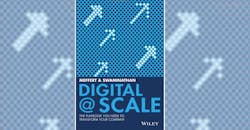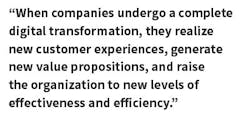If you were hoping that Digital@Scale would somehow sanction easing into the digitization of your company, you’ll be sorely disappointed. Authors Anand Swaminathan and Jürgen Meffert, both senior partners with McKinsey, set the tone in the first paragraph of their book with this statement: “In the digital age, companies need to rethink their entire business models. Those who don’t risk failure and extinction.”
They also quickly disavow business leaders of two false notions. One is that digitization is an information technology issue. While digital technologies are important, the authors emphasize that the goal of digitization is not spiffy new software and other tech, but “completely new business models.” The second falsehood is that digitization can be delegated off the CEO’s desk. Instead, they argue, digitization “starts with the CEO.”
CEOs receive plenty of attention in Digital@Scale [John Wiley & Sons, 2017, 288 pages, $29.95] because the authors say the stakes are so high and because many CEOs are unsure about how to tackle this forbidding and fearsomely fast change. CEOs admit they lack an “overarching digital strategy” and too often believe they are confronting simply a technical issue.
Digital@Scale points to a number of early victims of digital disruption – Compaq, Kodak and Blockbuster – to make the case that companies must jump on this challenge. And the book offers plenty of examples that the firms who have embraced a digital future find the results richly rewarding. For example, the authors point to Baosteel, a Chinese iron and steel company that created an online marketplace called Ouyeel. At first, the site was just an online channel for the company’s products but it has since expanded to include competitors’ products and a range of related services such as financing and logistics. Revenue from Ouyeel grew 300% annually between 2013 and 2015, when the company’s digital revenue topped $800 million.
Increased efficiency is a common objective for many manufacturers where digital competition is not as profound but companies find themselves under cost pressures. Oddly enough, a high degree of efficiency is a common impediment to digitization. The authors explain: “When business is going well, the company lacks the sense of urgency: specialization and a strong division of labor are barriers to the necessary cross-functional approach for a digital transformation.”
As its sub-title states, Digital@Scale is designed to help companies assess what they need to change, develop a plan, create the culture and systems to carry it out and move from test cases to digitizing the entire company. While the book is detailed, it is a guide, not a cookbook. The authors caution that plans will change – quickly – as they are tested and customers respond. If your company is about to embark on a digital transformation, keep this perspective from Swaminathan and Meffert in mind: “Digitization is a journey into the unknown.”
About the Author
Steve Minter
Steve Minter, Executive Editor
Focus: Leadership, Global Economy, Energy
Call: 216-931-9281
Follow on Twitter: @SgMinterIW
An award-winning editor, Executive Editor Steve Minter covers leadership, global economic and trade issues and energy, tackling subject matter ranging from CEO profiles and leadership theories to economic trends and energy policy. As well, he supervises content development for editorial products including the magazine, IndustryWeek.com, research and information products, and conferences.
Before joining the IW staff, Steve was publisher and editorial director of Penton Media’s EHS Today, where he was instrumental in the development of the Champions of Safety and America’s Safest Companies recognition programs.
Steve received his B.A. in English from Oberlin College. He is married and has two adult children.

